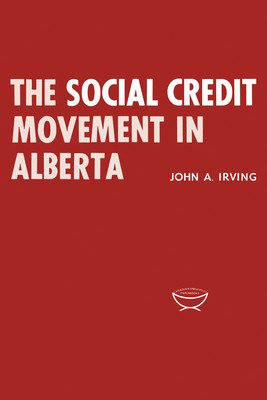
- We will send in 10–14 business days.
- Author: John A Irving
- Publisher: University of Toronto Press
- ISBN-10: 0802060846
- ISBN-13: 9780802060846
- Format: 15.2 x 22.9 x 2.2 cm, minkšti viršeliai
- Language: English
- SAVE -10% with code: EXTRA
Reviews
Description
"On the night of August 22, 1935, as Canadians listened to their radios, they heard, with amazement and incredulity, that the first Social Credit government in the world had been elected that day in the province of Alberta. . . . Before the tabulation of votes was completed, telephone calls from New York and London, headlines in newspapers, spot news in broadcasts, had confirmed the slogan of Social Crediters, 'The Eyes of the World are on Alberta.' The morning after the election a number of people lined up at the city hall in Calgary to collect the first installment of the Social Credit dividend of $25 monthly, which, they confidently believed, would be immediately forthcoming from their new government."
This quotation from Professor Irving's book indicates how the apparent suddenness of the Social Credit rise to power and the magnitude of the victory aroused world-wide comment. Why had the doctrines of Social Credit, promoted unsuccessfully in the British Commonwealth and the United States for nearly twenty years, achieved political acceptance in Alberta? Why had the people of Alberta elected to public office persons so little experienced in the economic and political world as William Aberhart and his Social Credit colleagues? Professor Iving answers these questions and analyses systematically and comprehensively the rise of the movement as a phenomenon of mass psychology. His study, based mainly on interviews, supplemented with references to private papers, newspapers, and government sources provides a truly fascinating record.
EXTRA 10 % discount with code: EXTRA
The promotion ends in 21d.10:50:03
The discount code is valid when purchasing from 10 €. Discounts do not stack.
- Author: John A Irving
- Publisher: University of Toronto Press
- ISBN-10: 0802060846
- ISBN-13: 9780802060846
- Format: 15.2 x 22.9 x 2.2 cm, minkšti viršeliai
- Language: English English
"On the night of August 22, 1935, as Canadians listened to their radios, they heard, with amazement and incredulity, that the first Social Credit government in the world had been elected that day in the province of Alberta. . . . Before the tabulation of votes was completed, telephone calls from New York and London, headlines in newspapers, spot news in broadcasts, had confirmed the slogan of Social Crediters, 'The Eyes of the World are on Alberta.' The morning after the election a number of people lined up at the city hall in Calgary to collect the first installment of the Social Credit dividend of $25 monthly, which, they confidently believed, would be immediately forthcoming from their new government."
This quotation from Professor Irving's book indicates how the apparent suddenness of the Social Credit rise to power and the magnitude of the victory aroused world-wide comment. Why had the doctrines of Social Credit, promoted unsuccessfully in the British Commonwealth and the United States for nearly twenty years, achieved political acceptance in Alberta? Why had the people of Alberta elected to public office persons so little experienced in the economic and political world as William Aberhart and his Social Credit colleagues? Professor Iving answers these questions and analyses systematically and comprehensively the rise of the movement as a phenomenon of mass psychology. His study, based mainly on interviews, supplemented with references to private papers, newspapers, and government sources provides a truly fascinating record.


Reviews